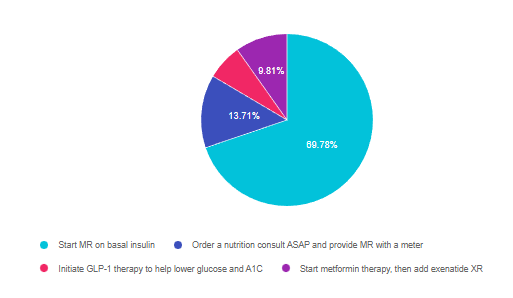
For last week’s practice question, we quizzed test takers on MR who was recently diagnosed with diabetes at age 13. 70% of respondents chose the best answer. We want to share this important information, so you can pass it on to people living with diabetes and your colleagues, plus prepare for exam success!
Before we start though, if you don’t want any spoilers and haven’t tried the question yet, you can answer it below: Answer Question
Question: MR is 13 years old, and went to urgent care because they weren’t feeling well and told the Provider “I feel so tired all the time and I have to go the bathroom a lot”. The provider draws labs and gets a urine sample. The A1C is 8.7% with some ketones in the urine. The antibody results aren’t back yet. Based on the ADA Standards and this information, what is the best action?
Answer Choices:
- Start MR on basal insulin
- Order a nutrition consult ASAP and provide MR with a meter
- Initiate GLP-1 therapy to help lower glucose and A1C
- Start metformin therapy, then add exenatide XR if needed

As shown above, the most common choice was option 1, the second most common answer was option 2, then option 4, and finally 3.
Getting to the Best Answer
Answer 1 is correct. 69.78% chose this answer, “Start MR on basal insulin.” YES, GREAT JOB. This is the best answer according to ADA Standard 14 on Diabetes and Youth. If a person under the age of 18 has new-onset diabetes and an A1C of 8.5% or greater, basal insulin is needed to get blood glucose to target and stop ketosis. The next step is to determine if they have immune-mediated diabetes by evaluating their autoantibodies. If they don’t have autoantibodies (GAD, ICA, IAA), then the guidelines suggest starting metformin and gradually decreasing the insulin to see if they can be managed on metformin alone or with the addition of a GLP-1 RA. If the antibodies come back positive, MR would need to be managed on basal-bolus insulin therapy.
Answer 2 is incorrect. 13.71% of you chose this answer, “Order a nutrition consult ASAP and provide MR with a meter.” This is a juicy answer since a nutrition consult and meter are critical to managing a new diabetes diagnosis. However, we would provide the nutrition consult after we figure out what type of diabetes and after lowering blood glucose levels with insulin to prevent a hyperglycemic crisis. Regardless of the type of diabetes, ordering a meter right away and providing basic nutrition guidelines are both critical steps to keep MR safe and to evaluate treatment response.
Answer 3 is incorrect. 6.70% of respondents chose this answer, “Initiate GLP-1 therapy to help lower glucose and A1C.” Since the A1C is above 8.5%, the ADA Standards state to start basal insulin to lower glucose and prevent hyperglycemic crises. If the autoantibodies come back negative, we would start metformin therapy and consider a GLP-1 RA as a future add-on therapy.
Finally, Answer 4 is incorrect. 9.81% chose this answer, “Start metformin therapy, then add exenatide XR if needed.” Since the A1C is above 8.5%, the ADA Standards state to start basal insulin to lower glucose and prevent a hyperglycemic crisis. If the autoantibodies come back negative, we would start metformin therapy and consider a GLP-1 RA as a future add-on therapy.
Want to learn more about this question? Join us for our upcoming webinar
Test Taking Practice Exam Toolkit | FREE Webinar
Are You Ready for Exam Success?
Join us live Thursday, June 30th at 11:30 am PST
Learn Test-Taking Secrets with Coach Bev – Option to add on 200+ Computerized Practice Test Questions for $49
During this webinar, Coach Beverly will help you transform your nervousness into focused energy that will help you succeed. She will provide test-taking tips based on her experience taking the certification exam six times.
To provide plenty of practice, Coach Beverly will sample 20 test questions that have been plucked from our Test Taking Toolkit during this live webinar.
She will explain how to dissect the question, eliminate wrong answers and avoid getting lured in by juicy answers.
Two Ways to Join
Includes a review of 20 sample test questions with test-taking strategies.
This includes access to the recorded version of this webinar on your Online University Student Portal.
Plus, the Test Taking Toolkit provides you with over 200+ sample online practice questions, simulating the exam experience.
A perfect way to assess your knowledge and create a focused study plan, while increasing your test-taking confidence.
From Tots to Teens | Level 2 | $29 for 1.5 CEs
Recorded & Ready to Watch!

This course includes updated goals and guidelines for children living with type 1 or type 2 diabetes. This course discusses the special issues diabetes educators need to be aware of when working with children with diabetes and their families. We discuss the clinical presentation of diabetes, goals of care, and normal growth and development through the early years through adolescence. Strategies to prevent acute and long term complications are included with an emphasis on positive coping for family and child with diabetes.
Objectives:
- Discuss the goals of care for Type 1 and Type 2 Kids with Diabetes
- State Strategies to prevent acute and chronic complications
- Discuss the importance of positive psychosocial adjustment and resources
The use of DES products does not guarantee the successful passage of the CDCES exam. CBDCE does not endorse any preparatory or review materials for the CDCES exam, except for those published by CBDCE.









